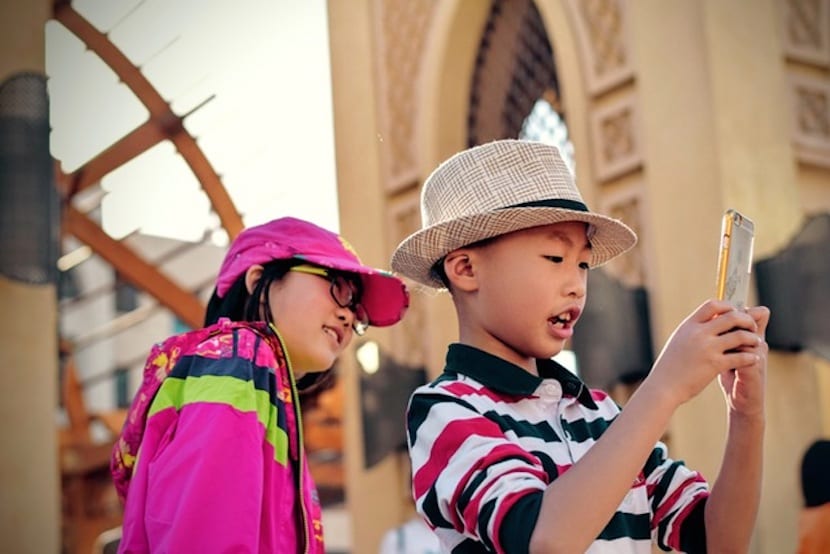
Today, like every first Tuesday in February, is the Safe Internet Day, a date to reflect on the challenges that families must take on in the relationship between our daughters and sons, and the consumption of audiovisual media. Audiovisual media that generate a lot of insecurities, and to which we dedicate a lot of time and energy, in order to act as mediators between minors, and those virtual spaces that (sometimes) offer age-inappropriate content and maturation of children.
Although, to tell the truth, the list of attributable advantages is quite extensive, but of course, if misuse can expose ourselves to certain risks, What better way than to establish measures that allow prevent those dangers?
There is a publication in Doxa Comunicación: interdisciplinary review of communication studies and social sciences, called “Mothers and fathers, minors and the Internet. Parental mediation strategies in Spain ". In it the authors analyze the mediation strategies of mothers and fathers, basing its results on data from the European network EU Kids Online (for Spain). The interviews took place in 2010, and the analysis finds, the so-called “active and restrictive mediation strategies” have a wide presence, while the follow-up or technological ones seemed to have little impact.

Next we will focus on each of these types of strategies, but first I would like to share with you, some of the conclusions provided by the aforementioned publication:
- A general reduction in the incidence of mediation is observed among minors between 13 and 16 years of age, compared to those between 9 and 12. Younger children seem more vulnerable to us, despite the fact that many behaviors can occur in adolescence risk, which if not "mediated", can expose you to serious dangers.
- The data presented by Spain in the year of publication of the work, were close to the European average, in terms of parental mediation.
- The true success of mediation always lies in equipping the minor with the ability to face risks, and prevent these from having negative consequences.
- Most Spanish parents talk to their children about safer use of the Internet.

We, our children and new technologies.
For minors the virtual and physical environments are united, although they may not be mixed, because they also have the desire to live intensely the second (without the first), however, at this point everything depends on the opportunities granted by the parents; This is another topic of discussion, but don't you think that sometimes we are more afraid of the physical world than the virtual world without there being a contrasted increase in dangerousness?
Let me explain: children get autonomy to go alone on the street very late, and for many years his movements in the physical environment are closely followed, having difficulty developing certain skills; by cons: It is so easy to acquire a tablet or a smartphone that we sometimes use as 'caregivers' or consolation of our children!
ICTs provide many, many advantages, and one of the most easily observed benefits is that through their use, children and adolescents they achieve the immediacy with which those ages “dream”: getting things done soon, and with little effort. That immediacy, added to an excess of confidence, and exceptional skills of use, result in a situation that can give problems, if the children have not been guided.

Parental mediation strategies.
We are responsible for digital education, but not the only ones responsible, and still not being the only ones: we often see ourselves investing time and energy intensively, and during the first 10 years of life (later too, but we are learning to "let go" and trust). Why? Well, as mothers and fathers we care about our children, and we also have the capacity to accompany and educate them, since we have a vital experience of great value.
The link provided above talks about: active, restrictive, follow-up or technical mediation. The last two modes of mediation refer to the monitoring of the contents visited by the child (records, etc.) and to the specific technical tools of parental mediation. There is an orientation that helps us to simplify the understanding of possible parental mediation strategies, is the next:
Active mediation.
Take an interest in your children: by their tastes, by their online activity ... it must be a natural presence, without interference, without questioning, from genuine interest. Children (and adolescents) appreciate dialogue, and ask for respect and trust; If these conditions are not met, it is difficult to establish positive communication. Don't be overwhelmed if you do it wrong, correct yourself if you yell or judge your children, but don't beat yourself up: tomorrow will be better.
Guide, transmit values, answer questions, speak spontaneously about what (as a mother, as a father) worries you, makes it easy for them to have the freedom to seek advice if they are lost or in difficulty. Common sense is included in active mediation: a 3-year-old cannot spend 3 hours in front of the tablet, a 6-year-old should not be able to play PEGI 16-rated video games, a 9-year-old girl does not need (or it is advisable) to go to bed with the smartphone… And so on. Use common sense and adapt the recommendations to your lifestyle and the norms of your family.
Restrictive mediation.
It involves the establishment of limits, the use of parental controls, and adapt the virtual environment to the maturity of the child, to avoid risks. Success is likely to be greater when we combine both mediation modalities.
Finally, it is worth commenting that the more external stimuli to the family, the more availability of ICTs in the lives of minors, greater presence of mothers and fathers can be expected (from intense to superficial, gradually decreasing according to age), in the lives of our children, and it is also possible to expect the development of skills that allow us to face the accompaniment requirements that are presented to us as if they were challenges.